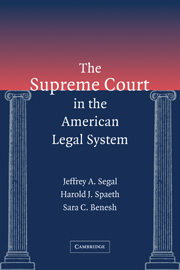9 - The U.S. Courts of Appeals
Published online by Cambridge University Press: 05 June 2012
Summary
District Court Judge Middlebrooks, as discussed in Chapter 8, denied the preliminary injunctive relief sought by Bush and Cheney and some voters after the 2000 Florida election votes. Those parties, as is their right, appealed the decision to the Eleventh Circuit of the U.S. Court of Appeals. As the courts of appeals have mandatory jurisdiction – that is, they must rule on the cases brought to them – and the case was properly before them, they heard and decided it. Nevertheless, the appeals court apparently thought this question particularly important and scheduled it for hearing en banc, meaning all twelve judges of the Eleventh Circuit participated, rather than the three-judge panel that usually hears cases. Although the judges did not fully agree, the majority agreed with Judge Middlebrooks, affirming his decision denying the injunction.
The facts of the case are familiar: Bush and Cheney (and some voters) alleged First and Fourteenth Amendment violations stemming from the manual recounts being conducted in some Florida counties, and they asked that those recounts be enjoined. Middlebrooks found no injury, and the appeals court, in an 8–4 decision, agreed.
In its per curiam – that is, unsigned – opinion, the court noted first that it did have jurisdiction over the matter because (1) it was not reviewing a state court decision; (2) the case was not moot; (3) it did not warrant federal court abstention; and (4) it did not depend wholly on a question of state law.
- Type
- Chapter
- Information
- The Supreme Court in the American Legal System , pp. 213 - 242Publisher: Cambridge University PressPrint publication year: 2005

